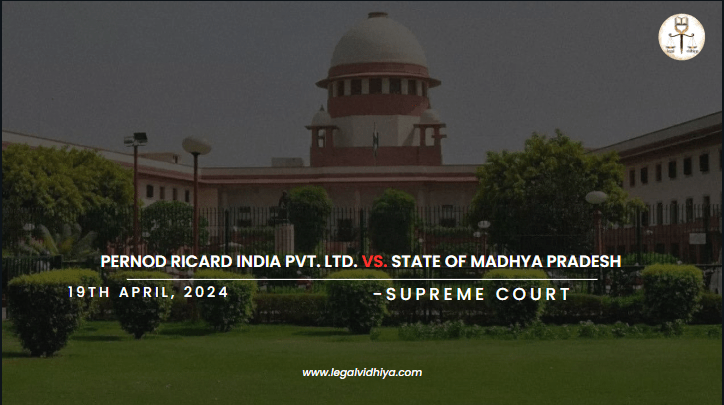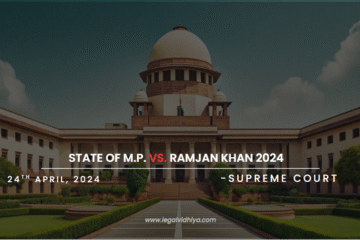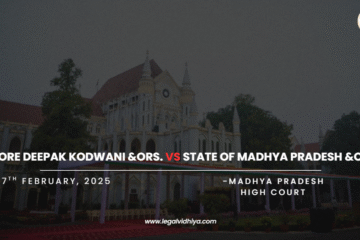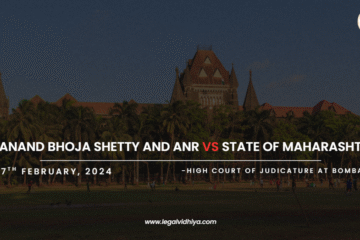
| CITATION | 2024 INSC 327 |
| DATE OF JUDGEMENT | 19th April, 2024 |
| COURT | Supreme Court of India |
| APPELLANT | Pernod Ricard India Pvt. Ltd. |
| RESPONDENT | State of Madhya Pradesh |
| BENCH | J. Pamidighantam Sri Narasimha and, J. Aravind Kumar |
INTRODUCTION
In the case of Pernod Ricard India Pvt. Ltd. Vs State of Madhya Pradesh, the role of Pernod Ricard India, as a sub licencee under the M.P. Excise Act, 1915, was central to the legal proceedings. The case revolved around the imposition of penalties under different rules – one existing during the violation in the licence period of 2009-10 and another substituted in 2011 when penalty proceedings were initiated. The case includes Pernod Ricard India Pvt. Ltd. legal battle to minimise the penalty imposed on it by the state authorities for liquor losses during transportation. The High Court rejects the petition filed by the Appellant. The judgement was given on 19th April, 2024 by the Supreme Court of India. The Enforcement Directorate (ED) plays a significant role in the case.
FACTS OF THE CASE
- Pernod Ricard India Pvt Ltd is a company engaged in manufacturing and distribution of wines, liquids and spirits. It holds a sub licence under the M.P. Excise Act, 1915 for manufacture, import and sales of foreign liquor regulated under the Madhya Pradesh Foreign Liquor rules,1996.
- Sub-Licensees importing foreign liquor are granted transit permits, which record the origin, quality, quantity and point of delivery of the imported liquor. At the destination, the consignment is verified, and a certificate under rule 13 is granted.
- The breach in this case took place during Pernod Ricard’s licence period of 2009-10. The penalty for the breach was around four times the maximum duty payable on foreign liquor under the old Rule 19.
- In March 2011, Rule 19 was substituted by an amendment reducing the penalty form four times the duty to an amount not exceeding the duty payable.
- In 2011, a notice was issued to Pernod Ricard seeking payment of the higher penalty under the old Rule 19 for the 2009-10 breach.
- Pernod Ricard Challenged this notice, arguing the lower penalty under the substituted Rule 19 should apply the statutory authority and High Court rejected this argument.
ISSUES RAISED
- What was the relevant rule for imposition of penalty on Pernod Ricard for loss of liquor in transit- the rule that existed when the violation occurred during the licence period of 2009-2010 or the substituted rule of 2011 that reduced the penalty amount?
- When a rule is substituted, does the substituted rule commence operation only from the date of its issuance, unless a specific date is notified by the government for its commencement?
CONTENTIONS OF APPELLANT
- The main contention of the appellant in the case against the state of Madhya Pradesh was that the penalty should be imposed based on the substituted Rule 19 which came into effect on 29.03.2011 and not the old unamended Rule 19 that was in place during the licence period of 2009-10 when the violation occurred.
- The appellant argued that the effect of substitution is to repeal the existing provision entirely and enforce the newly substituted provision in its place. They contended that even for incidents that occurred under the old Rule, the substituted Rule should be applied, and the demand notice dated 22.11.2011 seeking payment of penalties under the old Rule, is considered illegal by the appellant.
- The appellant’s main argument was that, if the amendment via substitution in 2011 was intended to reduce the quantum of penalty for better administration and regulation of foreign liquor, there is no justification to ignore the subject and context of the amendment and permit the state to recover the penalty as per the unamended Rule. The appellant contended that the substituted Rule 19 with a lower penalty should be applied retrospectively for the 2009-10 licence violation.
CONTENTIONS OF RESPONDENT
- The respondent’s main contention revolved around the application of the old rule versus the substituted rule for the imposition of penalties. The respondent argued that the penalty should be imposed based on the old rule that was in place during the licence period of 2009-2010 when the violation occurred, rather than the substituted Rule 19 that came into effect on 29.03.2011 which lowered the penalty amount.
- The respondent’s representative contended that under the Madhya Pradesh General Clauses Act, 1957, the state could continue to apply the repealed rule for the transaction of 2009-10 citing Section 10 of the Act, which specifies the effects of They considered the demand notice seeking payment of penalties under the old rule as illegal and insisted on the continued application of the repealed rule for the 2000 and 2010 transaction repeal and the non-revival of previous enactments, unless a different intention appears.
- The respondent argued that the penalty determination is a substantive law that cannot operate retrospectively and that the operation of subordinate legislation differs as they rely on the parent act.
- In response to the appellant’s argument that the effect of substitution is to repeal the existing provision entirely and enforce the newly substituted provision. The respondent maintained that even for incidents that occurred under the old rule, the substituted rule should not be applied. They considered the demand notice seeking payment of penalties under the old rule as illegal and insisted on the continued application of the repealed rule for the 2009-10 transaction.
JUDGEMENT
The High Court Judgement highlighted the rejection of appellant’s applications for a temporary injunction in a suit alleging infringement. The court emphasised the need for plaintiffs to prove actual damages for seeking a temporary injunction and the settle principle for granting interim injunctions. The judgement of High Court, which had upheld imposing the higher penalty under the old rule, was set aside. The Supreme Court accepted appellant’s contention and allowed the appeal, determining that the purpose of the amendment was to achieve a proper balance between the offence and penalty. The court referred to the distinction between super session and substitution of a rule where substitution involves repealing the old rule and bringing a new rule in its place. The court explained that without statutory empowerment, subordinate legislation commences operation only from the date of issuance and ceases to exist from the date of deletion or withdrawal. The court held that classifying offenders into before or after the amendment for imposing higher and lower penalties does not serve any public interest. The court directed that the substituted Rule 19 alone will apply to pending proceedings and the penalty on appellant will be based on the substituted rule. The judgement was in the favour of the Appellant.
ANALYSIS
The case of Pernod Ricard India Pvt. Ltd. Vs State of Madhya Pradesh, sets a significant precedent for the upcoming future cases regarding the applicability of rules for the imposition of penalties. The judgement focused on the determining whether the rule is placed at the time of the violation or the rule substituted later should apply for penalty imposition. The Supreme Court, in its ruling emphasized the importance of achieving a proper balance between the crime and punishment. It is also said that the substituted rule which reduced the quantum of penalty should apply to pending proceedings to ensure fairness and avoid classifying offenders based on the time of the violation. This decision highlights the need to consider the purpose of amendments in laws to ensure a just and balanced approach to penalties. The case also delved into the interpretation of the statutes, emphasizing the importance of understanding the true meaning of legal provisions.
CONCLUSION
The legal basis for Pernod Ricard India Pvt. Ltd., petition in various cases involves challenging decisions made by government authorities regarding its licences and penalties. The ED (Enforcement Directorate) has accused the appellant of various policy violations, particularly related to credit notes issued to different entities for liquor purchases. The appellant has been accused of not providing credit notes to certain enterprises while issuing them to others, leading to allegations of favouritism and involvement in questionable practises. But the appellant argued for the application of the substituted rule, which reduces penalties while the authorities imposed higher penalties under the old rule. The court directed that the substituted rule should apply to pending proceedings, stating that classifying offenders based on pre or post amendments for penalties does not suffer public interest. The Supreme Court ruled in the favour of Appellant.
REFERENCES
- https://www.indiacode.nic.in/bitstream/123456789/7450/1/mp
- https://indiankanoon.org/doc/35537101
- https://www.casemine.com/judgement/in/
This article is written by Priya Patel student of S.S Khanna Girls’ Degree College, Prayagraj. Intern at Legal Vidhiya.
Disclaimer: The materials provided herein are intended solely for informational purposes. Accessing or using the site or the materials does not establish an attorney-client relationship. The information presented on this site is not to be construed as legal or professional advice, and it should not be relied upon for such purposes or used as a substitute for advice from a licensed attorney in your state. Additionally, the viewpoint presented by the author is of a personal nature.




0 Comments